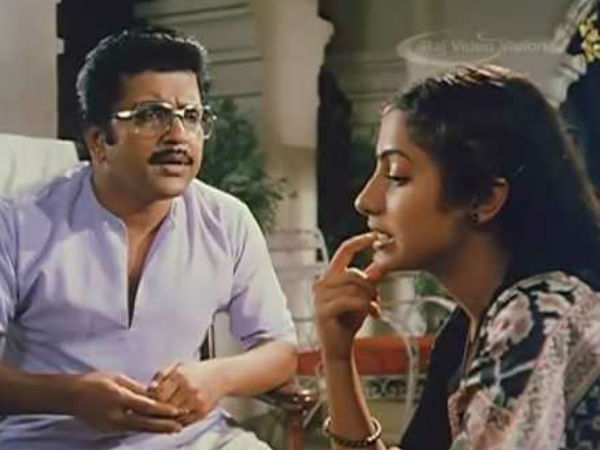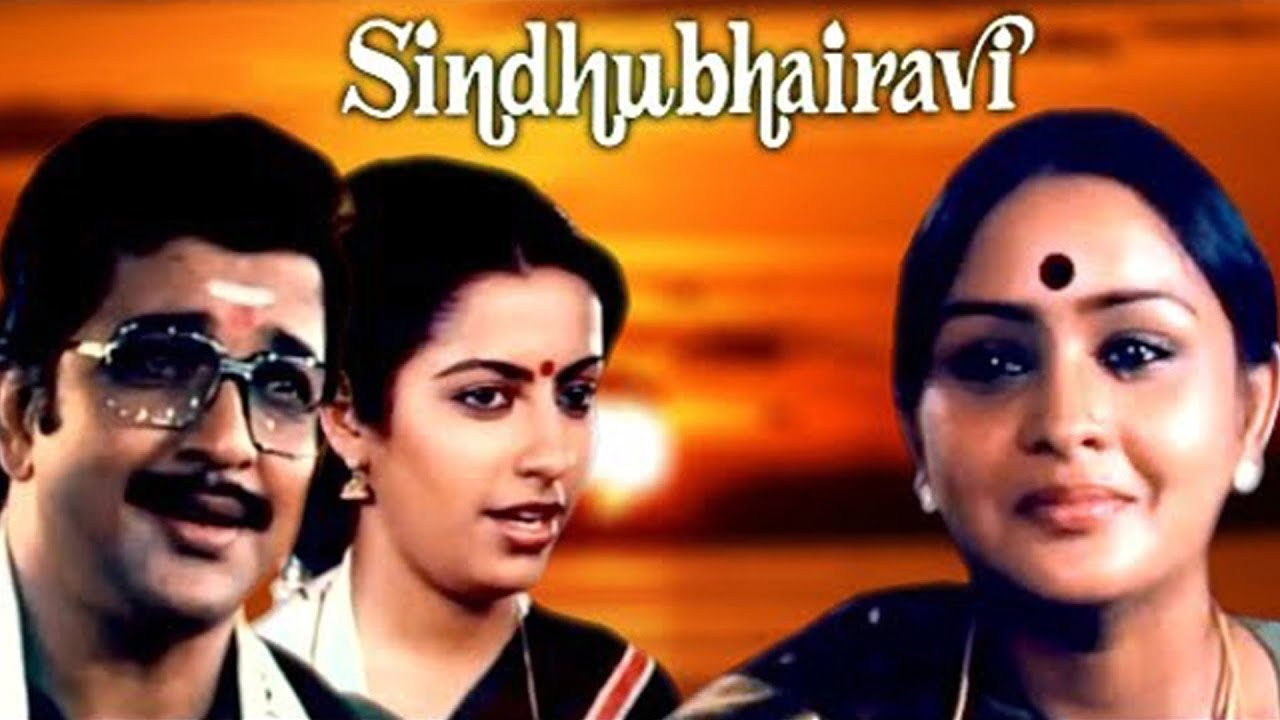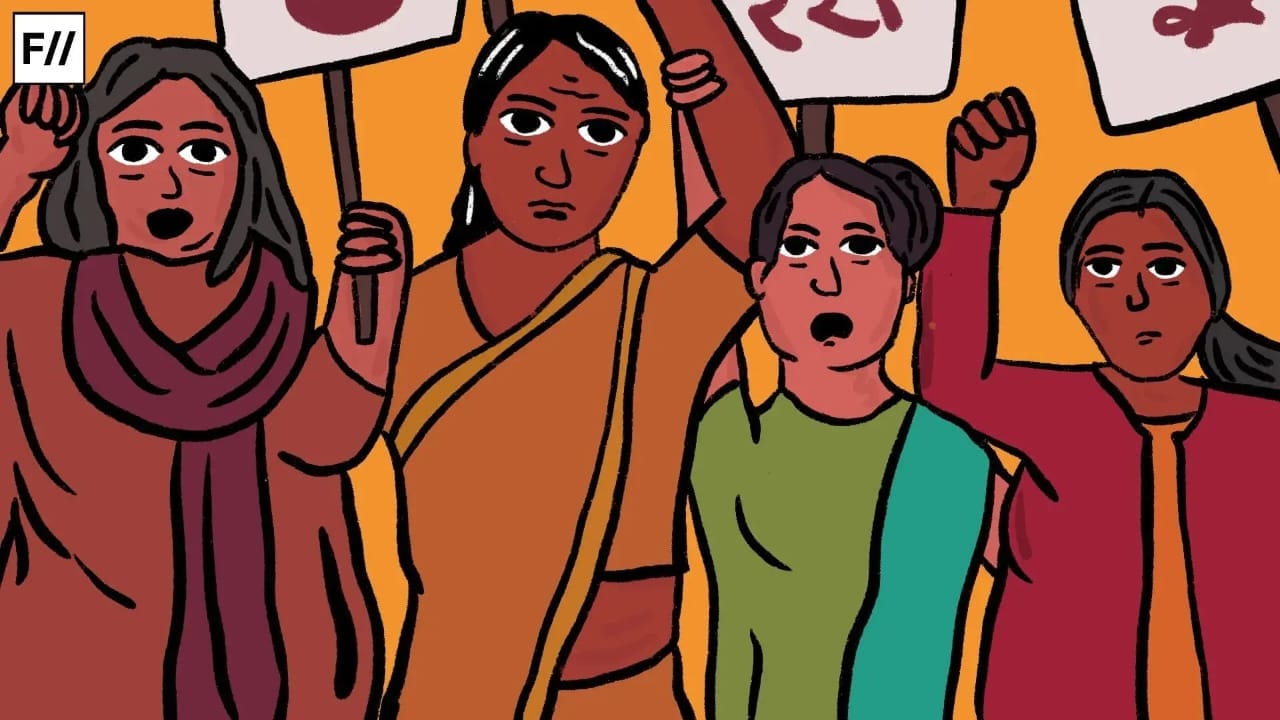Sindhu Bhairavi is a Tamil movie directed by K. Balachander that was released on 11th November 1985. As a devout fan of this movie, I can share with you one thousand and odd things I love about this movie. The songs in Sindhu Bhairavi have so much meaning in them, making the listener feel common human emotions intensely. And multiple aspects of the writing and movie-making are spectacular, too. However, on the 35th anniversary, I wish to shift the perspective a little and we see what’s patriarchal about this yesteryear musical masterpiece Sindhu Bhairavi.
The major characters in the film are the famous Carnatic singer “JKB”, his wife Bhairavi, and his devout fan and then lover Sindhu, played by Sivakumar, Sulakshana, and Suhasini respectively. The story is about how the Carnatic singer and his wife are happily married and have everything they could ask for, yet there is one thing that JKB longs for and finds missing in his marriage: the presence of someone who is just as fiercely passionate about music as he is. He then meets Sindhu, one of his most loving fans, an independent woman who is highly individualistic and skilled, and JKB and Sindhu end up in an extra-marital affair. What follows then is all that Sindhu Bhairavi is about.
Also read: Tamil Cinema And Its Misogyny Endorsing The Vain Macho-Hero Image
The Problematics of Sindhu Bhairavi
From the very beginning, the director/writer of Sindhu Bhairavi labels openly and portrays the wife as an ignorant woman, for she is a loyal and loving housewife, but has no knowledge about or affiliation towards music. In various instances, JKB either jokingly or angrily calls his wife Bhairavi “dumb”. No matter how affectionate and loving he is towards his wife, he is a condescending, misogynistic man. Not only is it an ableist form of abuse, in retrospect, one might also wonder how skilled was the husband with household chores, the arena that Bhairavi probably knew as well as he his music? The conservative, patriarchal Indian husband, alright.
JKB’s desperate longing for someone in his life he could share his love for Carnatic music with is very beautifully portrayed in Sindhu Bhairavi. That part is understandable. However, the society’s tendency to normalise a man betraying his wife is made evident in Sindhu Bhairavi too. What would be the case had roles been reversed, and if the wife had cheated? All hell would have broke loose and they would not have hesitated to vilify her as a woman with loose morals, unlike how in Sindhu Bhairavi, JKB’s act is justified as him seeking companionship in his genius. Double standards? Check.
As Sindhu admits, JKB, the male lead in Sindhu Bhairavi exploits her strong admiration and respect for him, and wants to have sex with her with no intention of marrying her, to simply satisfy his own needs. Again, as a man, JKB’s assertion of his privilege and toying with the emotions of two women is normalised. Further, the creation of a binary: that of an independent, individualistic and driven woman as the ‘homewrecker’ and the docile housewife with no knowledge in music but devotedly in love with her husband creates a differentiation that pitches women against women, in what is a highly patriarchal narrative. A story written, directed, and produced by a man, alright, so it’s only the man’s needs that are real needs.
The creation of a binary in Sindhu Bhairavi, that of an independent, individualistic and driven woman as the ‘homewrecker’ and the docile housewife with no knowledge in music but devotedly in love with her husband creates a differentiation that pitches women against women, in what is a highly patriarchal narrative.

The woman that’s his affair is shown in bad light: When the affair in Sindhu Bhairavi is no longer a secret, starting from that point, it is the woman Sindhu who is shown in bad light throughout the movie. Not one person including the wife or even the judge questions or confronts the man. Sindhu receives all hate, when it is primarily it is JKB who is responsible for this because she did not develop a sexual or romantic attraction to him first. Yet who receives the punishment for getting into an extramarital affair and accused of breaking the marriage? Only the woman. Again, reminds you of Manusmriti?
The wife is compelled to be committed no matter what: On the other hand, the wife Bhairavi is supposed to be accepting, tolerant, loving, and still loyal to the husband no matter how bad a husband he is – not only does he cheat on and lie to his wife, but also becomes an alcoholic. In Sindhu Bhairavi, the wife is not even allowed to grieve over how she has been betrayed? Before she could even come to terms with reality, the husband becomes addicted to liquor, and she is expected to be his caretaker. Exactly what a patriarchal society would expect from a ‘normal’ wife.
Also read: How Tamil Cinema Normalises And Promotes Rape Culture

The man’s career vs. the woman’s career: It is indeed shown clearly throughout the movie that both JKB and Sindhu are equally knowledgeable and skilled in music. In fact, Sindhu even knows better than JKB does – it was originally her idea that he should start singing songs in Tamil. Still, when the public get to know about their secret affair, it brings shame to JKB and affects his life much, yet all his well-wishers in Sindhu Bhairavi supports the man, and the woman is forced to leave the town. After he recovers from his addiction, with the help of both Bhairavi and Sindhu, the man has little problem is regaining his fame and his career as a Carnatic singer is secure again. But the woman loses social respect, her job, is compelled to find a new job, and a new life, apart from being shamed.

In the end in Sindhu Bhairavi, the man got everything he could ask for – a loving wife, a huge fan following, fame, social support, a child, wealth, good health, etc., and the wife that had to tolerate all his misdeeds was portrayed as a stereotypical good wife (on patriarchal terms, of course), and the lover was shown as a regretful, yet strong woman that would probably remain single, accepting of all the hate the society gave her.
In the end in Sindhu Bhairavi, the man got everything he could ask for – a loving wife, a huge fan following, fame, social support, a child, wealth, good health, etc., and the wife that had to tolerate all his misdeeds was portrayed as a stereotypical good wife (on patriarchal terms, of course), and the lover was shown as a regretful, yet strong woman that would probably remain single, accepting of all the hate the society gave her.
So according to writer and director K. Balachander of Sindhu Bhairavi, a man could get away with anything he does to women and need only feel bad and seemingly apologetic for a short while, whereas women, be they housewives or working, financially independent women, must be flagbearers of patriarchy! This is why men shouldn’t be allowed to define feminism, or even the ‘feminists’ they create, like Sindhu for instance, will be no different from being slaves of men.
Sindhu Bhairavi is a movie made 35 years ago. But don’t you think several of the then normalised and even romanticised patriarchal instances shown in this movie are just as common even today? Not much has changed between Silappadhigaaram and Sindhu Bhairavi, right?
Featured Image Source: YouTube
About the author(s)
Lakshmi Prakash is a psychotherapist and writer that loves behavioural sciences and everything out of syllabus. Annoying her is easy: tell her to conform. Befriending her is easy: crack silly jokes (the sillier your joke, the louder her laugh). She can be found on Facebook, Instagram and Twitter.





Oh fuck ? I have never heard of this film before but I’m not surprised by the manner they portrayed the women characters and pitted them against each other while justifying all the wrongdoings of the man.
Loved reading this and wanted to simply add in one more point. Sindhu chooses to walk away saying that you cant share your husband, suppressing all her feelings and emotions, I cant but wonder what would have happened if she had stayed and had not pushed herself into a box of being a rasika… which is not even true with the way she is portrayed!